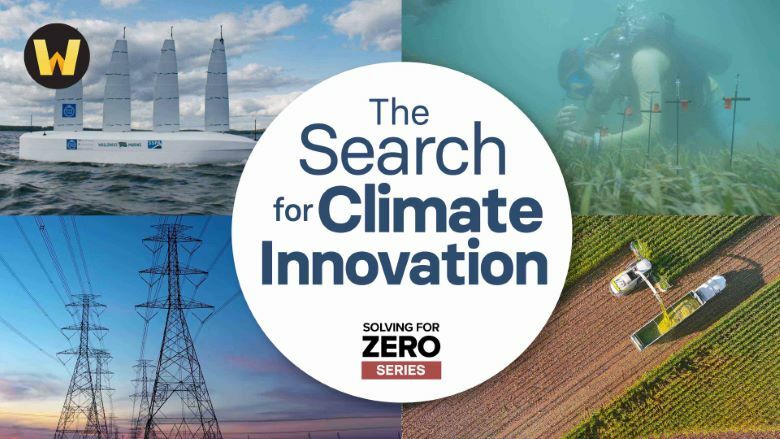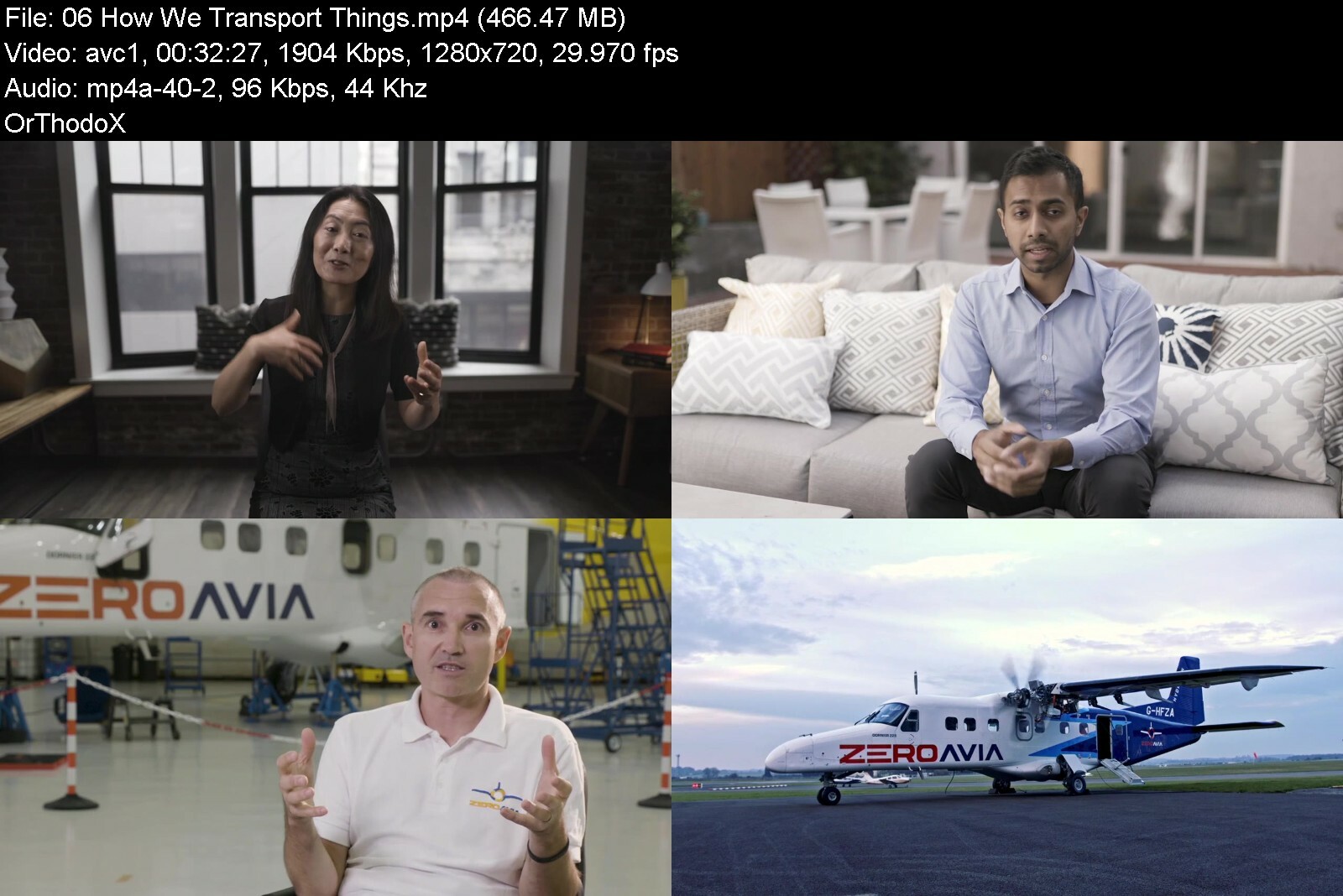
TTC - Solving for Zero: The Search for Climate Innovation
Released 04/2022
MP4 | Video: h264, 1280x720 | Audio: AAC, 44.1 KHz, 2 Ch
Genre: eLearning | Language: English | Duration: 10 Lessons (4h 50m) | Size: 4.22 GB
For 150 years, humans have been pouring an ever-increasing amount of carbon dioxide (CO2) into the atmosphere, upsetting the balance that nature has maintained for eons. The excess CO2 boosts the natural greenhouse effect, raising temperatures, increasing the frequency and severity of violent storms, and causing sea level to rise
The only solution to avoid a climate catastrophe is to drastically reduce our CO2 output and that of other greenhouse gases, including methane and nitrous oxide. The official international goal is zero net emissions by 2050. But with the modern world's dependence on fossil fuels and carbon-emitting technologies, how do we get there?
Solving for Zero: The Search for Climate Innovation is a detailed roadmap for meeting the zero emissions target. Hosted by Bill Gates and based on his New York Times best-selling book, How to Avoid a Climate Disaster, the course focuses on revolutionary developments that give us good reason to believe we have the talent and technologies to escape the worst effects of climate change.
More than a primer on climate change and proposed solutions, the 10 informative half-hour lessons get firsthand information from scientists, engineers, and policy makers on the cutting-edge of climate innovation, drawing on interviews with 22 experts in fields ranging from fusion technology to carbon capture to sustainable agriculture.
Look around you and imagine the place you are right now three decades in the future. The wood, glass, cement, steel, and plastics, the electricity you use, and the food you eat-all of it could be made and transported in completely new ways with little to no impact on our climate. In other words, the world of the future could look much like that of today, except without contributing to climate change. That hopeful vision is what it means to solve for zero.
51 Billion to Zero
Fifty-one billion is the number to aim for. That's how many tons of greenhouse gases human activities add to the atmosphere during a typical year. To envision it, 51 billion tons of gas would fill a cube with each side measuring 21 miles, for a total of nearly 10,000 cubic miles of pollutants. Reducing that volume to zero is a daunting task, but it's possible says Gates, who approaches the problem with the logic and big-picture thinking that he brought to the software industry.
A key concept for evaluating the most cost-effective strategies is the "Green Premium." This is the extra cost connected with "clean" non-carbon-emitting technologies compared to traditional "dirty" ones. The premium varies depending on the technology, location, and other factors, but it's a vital tool that this course applies to the five major sectors affecting the climate. Ranked in order of greenhouse emissions, starting with the largest, they are
Manufacturing: Cement and steel production are the major sources in this category. For now, the Green Premiums are high, since CO2 emissions from cement and steel must be removed by carbon capture, which is expensive. However, new techniques are in the works to greatly reduce CO2 from these sources.
Electricity: Generating electricity by solar and wind power typically costs less than extracting it from burning coal, oil, or natural gas. Currently, the problem is intermittency, or the lack of continuous power from sources that depend on the sun and wind. Long-term batteries are being developed to address this issue.
Agriculture: Unfortunately, the methane and nitrous oxide produced in stock raising and food cultivation have many times the warming effect of an equal amount of CO2. The Green Premium is high for reducing these pollutants, which will involve changes in the way we farm, including solutions such as synthetic meats.
Transportation: Often considered the sector most responsible for CO2 emissions, transportation is actually the 4th-ranked contributor. As electric cars get cheaper due to improved batteries, the Green Premium in this category is dropping. The new challenge is clean trucks and planes, running on hydrogen, which releases water vapor instead of CO2.
Heating and Cooling: As with generating electricity, the Green Premium for heating and cooling is actually negative, meaning that home and building owners can save money by switching to systems such as electric heat pumps. Specialized sealants for ductwork add to the savings by increasing heating and cooling efficiency.
There Is No Planet B
Among the nearly two dozen experts interviewed on Solving for Zero is Paul Edwards, director of Stanford University's Program on Science, Technology, and Society, and one of the authors of the Sixth Assessment Report issued by the United Nations Intergovernmental Panel on Climate Change. Edwards notes that since the onset of the Industrial Revolution in the 19th century, "We are currently at about a 1.2 degrees centigrade of warming. That doesn't sound like a lot, but if you consider that the average temperature of the Earth is 15 degrees centigrade, that's really a considerable amount." If humanity continues to burn fossil fuels at the current rate, the temperature by 2050 will rise an average of 2 degrees centigrade over preindustrial levels. That increase will be even higher in some regions.
Turning to one of the best-known green technologies-electric vehicles-Professor of Engineering Yang Shao-Horn at the Massachusetts Institute of Technology (MIT) explains the prospects for even greater improvements in lithium-ion batteries that power EVs. She also spells out why heavy vehicles like trucks must utilize a different source of clean energy, such as high-density hydrogen.
Also at MIT, Jacopo Buongiorno, Professor of Nuclear Science and Engineering, talks about his work on nuclear "batteries," a radically new type of fission reactor, about the size of a shipping container, that could power 10,000 homes. Nuclear reactors, in general, are becoming safer, cheaper, and more flexible, and should play a prominent role in solving for zero. The course also discusses promising developments in fusion power, which could be a breakthrough technology in the clean energy revolution.
Yet another of the on-camera experts is economist Ana Maria Loboguerrero, Research Director for the Consultative Group for International Agricultural Research. She describes work helping small farmers adapt to the effects of climate change through projects such as drought-tolerant and stress-tolerant maize, which is a staple crop throughout most of the world.
Like the other innovators in Solving for Zero, Loboguerrero keeps a positive outlook. She has seen the toll that climate change can take, but she also knows we have the tools to fight it. "I'm optimistic because I think that we got to a point where we all realize that this is serious, that everyone needs to take part of this and that if we don't do it, there's not a plan B. There's not planet B, this is the only planet that we have."
What Will You Learn?
Gauge prospects for meeting the international goal of zero carbon emissions by 2050
Learn the concept of the "Green Premium" and how to use it to evaluate green technologies
Study the five major sectors responsible for producing greenhouse gases
Explore ongoing innovations to decarbonize the atmosphere
https://anonymz.com/?https://www.thegreatcourses.com/courses/solving-for-zero-the-search-for-climate-innovation

download скачать from RapidGator
https://rapidgator.net/file/d94db9428747c8b32c1fec249c1d77ef/Solving_for_Zero_The_Search_for_Climate_Innovation.part1.rar https://rapidgator.net/file/6370e90ee7f7f71089e10f2d4d1e06d2/Solving_for_Zero_The_Search_for_Climate_Innovation.part2.rar https://rapidgator.net/file/15ee8ce6076f78601522d75cd7adf69d/Solving_for_Zero_The_Search_for_Climate_Innovation.part3.rar
download скачать from Keep2Share
https://k2s.cc/file/86cd2d84e8d19/Solving_for_Zero_The_Search_for_Climate_Innovation.part1.rar https://k2s.cc/file/4cd6c95eff494/Solving_for_Zero_The_Search_for_Climate_Innovation.part2.rar https://k2s.cc/file/4b7b03d5edb3a/Solving_for_Zero_The_Search_for_Climate_Innovation.part3.rar

